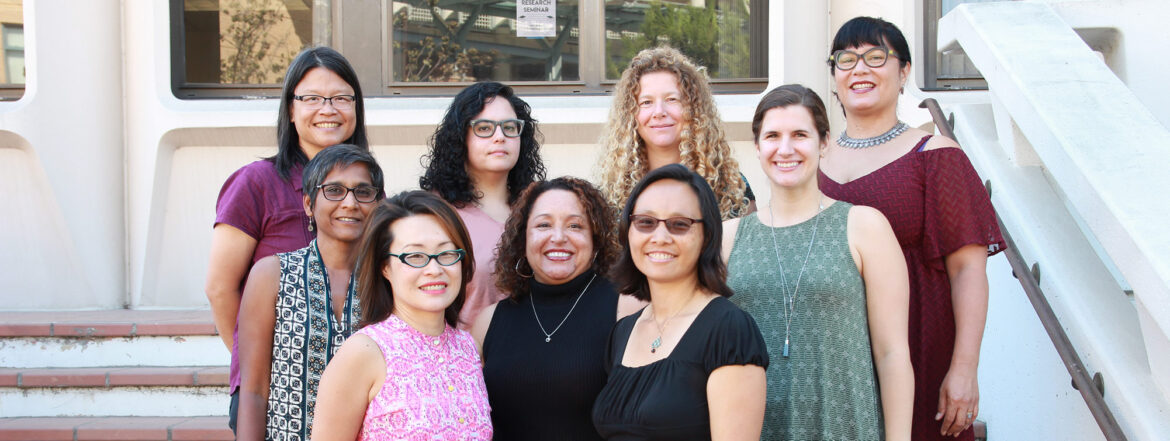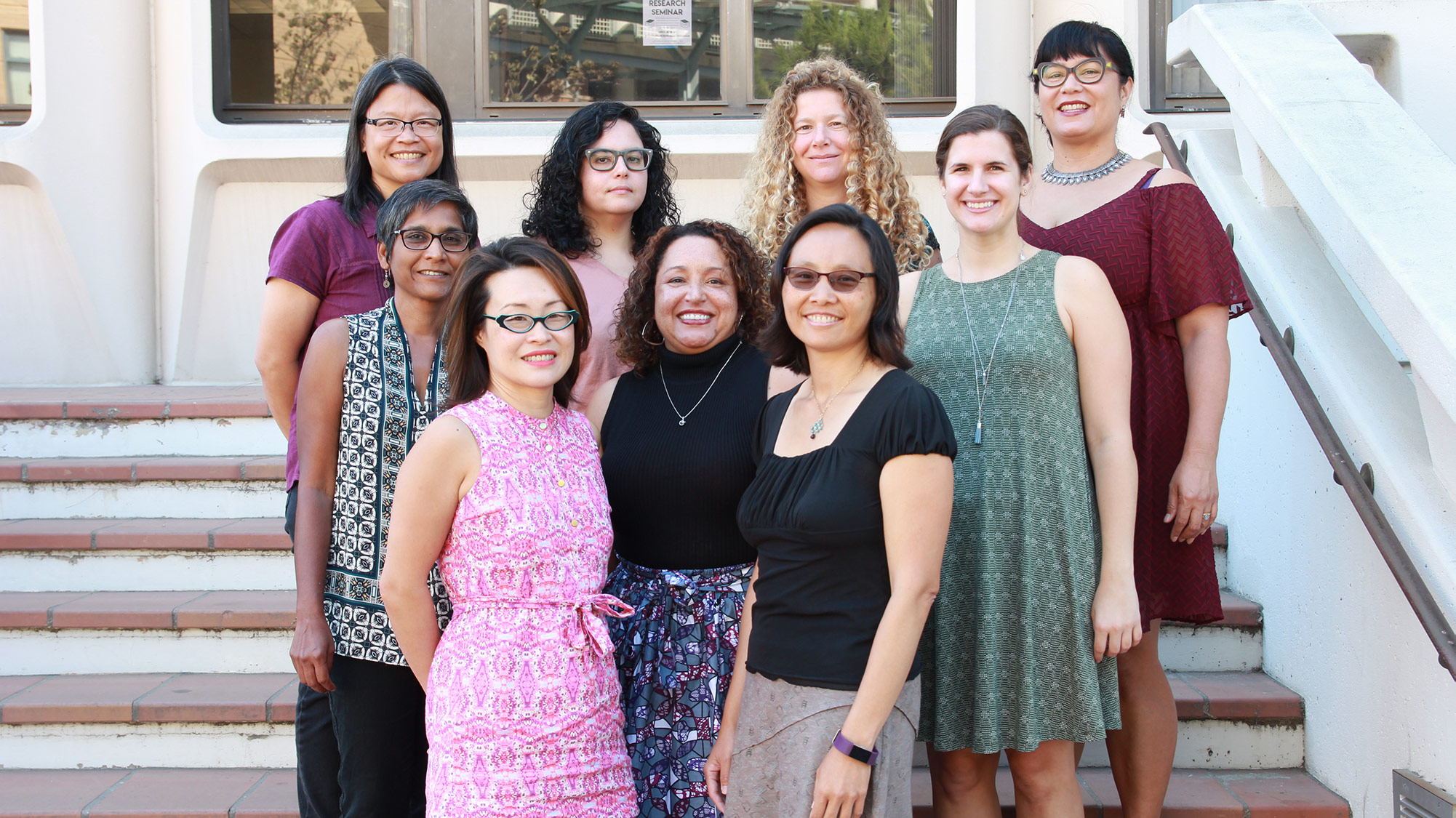Transnational Feminisms Interdisciplinary Bibliography
Residential Research Groups (RRGs) are the longest-standing grant program at UCHRI, and these groups remain the cornerstone of our grantmaking activities. RRGs are in essence teams of researchers—often unknown to one another before residency—who convene at UCHRI for one quarter to accomplish a commonly-defined research agenda. In Fall 2017, UCHRI hosted a residential research group that collectively examined the heterogeneous field of transnational feminism.
Traditionally, collaboration in RRGs may take many forms. Cooperation across disciplines elicits challenges of language, terminology, and methodology for all RRGs. The organizing premise of the residential research program is that when those challenges are surmounted, breakthroughs in knowledge are possible. Listen to a podcast with the RRG conveners to hear how this collaboration worked in practice:
To further represent this interdisciplinary knowledge sharing, we have asked the RRG to craft an interdisciplinary bibliography that represents each individual member’s research and perspective on transnational feminisms. Taken separately, these materials represent key materials selected by scholars of an emerging field of study; when combined, the sources highlight the rich landscape of transnational feminisms.
 Judy Tzu-Chun Wu, American Studies, UC Irvine
Judy Tzu-Chun Wu, American Studies, UC Irvine
Judy Tzu-Chun Wu is a professor and chair of the Department of Asian American Studies at the University of California, Irvine. She authored Dr. Mom Chung of the Fair-Haired Bastards: the Life of a Wartime Celebrity (University of California Press, 2005) and Radicals on the Road: Internationalism, Orientalism, and Feminism during the Vietnam Era (Cornell University Press, 2013). Her current book project, a collaboration with political scientist Gwendolyn Mink, explores the political career of Patsy Takemoto Mink, the first woman of color US congressional representative and the co-sponsor of Title IX. Wu also co-edited Women’s America: Refocusing the Past, 8th Edition (Oxford 2015), Gendering the Trans-Pacific World (Brill 2017), and Frontiers: A Journal of Women’s Studies (2012-2017). She is the incoming co-editor of Women and Social Movements in the United States, 1600-2000 (Alexander Street Press).
Source name/link:
Leila J. Rupp, Worlds of Women: The Making of an International Women’s Movement (Princeton University Press, 1997).
Joane Nagel, Race, Ethnicity and Sexuality: Intimate Intersections and Forbidden Frontiers (Oxford University Press, 2005).
Jocelyn Olcott, International Women’s Year: The Greatest Consciousness-Raising Event in History (Oxford University Press, 2017).
How the source reflects your research:
I could include many books and articles, but I do tend to return to Rupp and Nagel and also admire the recently published study by Olcott. Rupp and Olcott, both historians, help us think about how women activists become invested in and engaged in internationalist politics that cross North/South divides. They examine the complex connections and divisions between women as they attempt to build political ties across national borders. Nagel, a sociologist, foregrounds the intersectional nature of cross-border contact, whether through colonization, war, or interracial relationships internal to the nation. I frequently cite her concept of the “military-sexual complex” to highlight the sexual politics of militarism.
 Maylei Blackwell, Chicana and Chicano Studies, UCLA
Maylei Blackwell, Chicana and Chicano Studies, UCLA
Maylei Blackwell is the author of the landmark ¡Chicana Power! Contested Histories of Feminism in the Chicano Movement (2011) as well as a co-editor of ¡Chicana Movidas! New Narratives of Activism and Feminism in the Movement Era (University of Texas Press, 2018). Her forthcoming book, Scales of Resistance: The Practice of Indigenous Autonomy in the Age of Neoliberalism (Duke University Press), draws on twenty years of research accompanying indigenous women’s organizing in Mexico and its diaspora. Her research on women’s social movements in the US and Latin America, transborder activism, and indigenous politics and migration have appeared in the US, Mexico, and Brazil in journals such as Meridians, Signs, Aztlán, Journal of Latin American Studies, Desacatos and Revista Estudos Feministas. She teaches Chicana and Chicano studies and gender studies and is affiliated faculty in American Indian studies at the University of California, Los Angeles. She has served as the chair of the Abya Yala Working Group of the Native American and Indigenous Studies Association (NAISA) and co-directs the digital story platform Mapping Indigenous Los Angeles (mila.ssc.ucla.edu).
Source name/link:
The Kino-nda-niimi Collective, The Winter We Danced: Voices from the Past, the Future, and the Idle No More Movement (Arbeiter Ring Publishing, 2014)
Bianet Castellanos, Lourdes Gutiérrez Nájera, Arturo J. Aldama, eds. Comparative Indigeneities of the Américas: Toward a Hemispheric Approach (University of Arizona, 2012)
Blackwell, F. Boj-López, L. Urrieta, 2017. Introduction: Critical Latinx Indigeneities. Latino Studies 15 (2): 126-137. https://link.springer.com/article/10.1057/s41276-017-0064-0
How the source reflects your research:
What if we reimagined transnational feminism via Indigenous feminist practices that are community-based transborder political formations that negotiate the complexities of both indigenous nations and settler states? I use the political vision of Abya Yala elaborated by indigenous women activists to recenter a transnational feminist ethic of relation and responsibility to each other, the land and other beings. Bridging these knowledge practices to the academic scholarship on hemispheric frameworks and comparative indigeneity in the Américas helps me center the multiscaled resistance of indigenous women’s organizing in Mexico and the US. Further, in thinking collectively with other scholars and activists of indigenous migration, I am exploring the complex relationships indigenous migrants have to settler colonial logics and processes.
 Rachel Fabian, PhD Candidate, Film and Media Studies, UC Santa Barbara
Rachel Fabian, PhD Candidate, Film and Media Studies, UC Santa Barbara
Rachel Fabian is a PhD candidate in the Department of Film and Media Studies at the University of California, Santa Barbara. She is the recipient of the 2016 SCMS Women’s Caucus Graduate Student Writing Prize, which she was awarded for her essay “Reconsidering the Work of Claire Johnston” (forthcoming in Feminist Media Histories). She is former managing editor of Camera Obscura: Feminism, Culture, and Media Studies and also served as the issue editor for the Media Fields Journal special issue titled “Access/Trespass.” Her dissertation, “Collectivity and Its Discontents: Transnational Figurations of 1970–80s Collective Media-Making and Activist Affects,” examines the interrelations among independent and activist film and video collectives that proliferated in the US, UK, India, Latin America, and elsewhere during the 1970s–80s from a transnational feminist perspective. Her research interests include: feminist film and media studies, production culture studies, film and media history, affect studies, and transnational feminist thought.
Source name/link:
Trinh T. Minh-ha, “‘Who Is Speaking?’ Of Nation, Community, and First-Person Interviews,” in Feminisms in the Cinema, edited by Laura Pietropaolo and Ada Testaferri (University of Indiana Press, 1995).
 Monisha Das Gupta, Women’s Studies and Ethnic Studies, University of Hawaii
Monisha Das Gupta, Women’s Studies and Ethnic Studies, University of Hawaii
Monisha Das Gupta is professor in the Departments of Ethnic Studies and Women’s Studies at the University of Hawaiʻi at Mānoa. She specializes in cross-border migration and migrant-led social justice movements to which she brings a critical and feminist transnational perspective. She is currently working on a book about anti-deportation organizing in Los Angeles, Long Beach and New York City. The book aims at bringing migration studies in dialog with feminist theories of sovereignty emerging from Indigenous Studies. Das Gupta’s first prize-winning book, Unruly Immigrants: Rights, Activism, and Transnational South Asian Politics in the United States (Duke University Press 2006), dealt with feminist, queer and labor organizing in South Asian communities on the East Coast. She has published in Gender & Society, Cultural Dynamics, Journal of Historical Sociology, and Latino Studies. She has contributed essays to several edited volumes.
Source name/link:
Trask, Haunani-Kay. From a Native Daughter: Colonialism and Sovereignty in Hawai’i. (University of Hawai’i Press, 1999).
Simpson, Audra. Mohawk Interruptus: Political Life Across the Borders of Settler States. (Duke University Press, 2014).
How the source reflects your research:
The chapter in Trask’s book on which I have drawn extensively for the framework of my book project is entitled, “Hawaiians and Human Rights.” The chapter explicates the ways in which racial minorities are drawn into a settler compact through civil rights discourses, which suppress the distinct sovereignty claims of Indigenous peoples and convert self-determination struggles into those for racial equality.
I use Simpson’s Mohawk Interruptus as a provocation to think about the United States itself as transnational — a constellation of sovereign indigenous nations which exist within the geopolitical formation over which the US settler state tries to stabilize its sovereignty claims.
 Grace Hong, Gender Studies and Asian American Studies, UC Los Angeles
Grace Hong, Gender Studies and Asian American Studies, UC Los Angeles
Grace Kyungwon Hong is professor of Asian American studies and gender studies at UCLA. Her research focuses on women of color feminism as an epistemological critique of and alternative to Western liberal humanism and capital, particularly as they manifest as contemporary neoliberalism. Most recently, she has been working on a project on situating Asian and Asian diasporic feminism both a genealogy of Third World feminism. She is the author of Death Beyond Disavowal: The Impossible Politics of Difference (University of Minnesota Press, 2015) and The Ruptures of American Capital: Women of Color Feminism and the Cultures of Immigrant Labor(University of Minnesota Press, 2006) and the co-editor (with Roderick Ferguson) of Strange Affinities: The Gender and Sexual Politics of Comparative Racialization(Duke University Press, 2011).
Source name/link:
Yoneyama, Lisa. Cold War Ruins: Transpacific Critique of American Justice and Japanese War Crimes. (Duke University Press, 2016).
How the source reflects your research:
In Cold War Ruins, Lisa Yoneyama argues that in the post-World War II era, the very idea that it might be possible to remedy incidences of historical injustice and violence through reparations or redress legitimizes US militarism by erasing the tracks of contemporary US empire. She observes that the narrative of the US occupation of Japan in the wake of WWII as a benevolent process of tutelage that ostensibly reshaped Japan’s atavistic, militaristic, and violent society to be fit for capitalist liberal democracy, in large part through the adjudication of Japanese war crimes, hides the conjoined complicity of both states as they work together to suppress anti-imperialist movements across the Asia-Pacific region. In this context, she theorizes what she calls the “redress cultures” of the 1990s to the present, for which her paradigmatic example is the transnational feminist movement for reparations for Japanese sexual slavery during the war (what’s more popularly known as the “comfort women” movement), as movements that both seek to be legible within the confines of the juridical and undermines the language of the juridical as means for justice. In so doing, Yoneyama posits such movements as the “return” of the decolonization movements of the 20th century repressed by the Pax Americana.
Yoneyama’s contextualization of such trans-Pacific Asian/Asian diasporic feminist movements is crucial to my current project, which seeks to situate Asian diasporic/Asian American feminism within U.S. Third World and women of color feminisms. Because of specific immigration histories, Asian American feminism’s development does not always correspond to the more familiar trajectories of Chicana or Black feminism. Rather than require commensuration between these different histories, in this project, I seek instead to trace the discontinuous trajectories and multiple temporalities of feminist of color engagements with what Yoneyama calls the “unfinished project of decolonization.”
 Rana Jaleel, Gender, Sexuality & Women’s Studies, UC Davis
Rana Jaleel, Gender, Sexuality & Women’s Studies, UC Davis
Rana Jaleel is an assistant professor of gender, sexuality, and women’s studies at the University of California, Davis. Trained in law, US political and cultural history, and queer feminist and critical ethnic studies, her work uses an interdisciplinary methodology to analyze the relationships between law, legal processes, and transnational feminist efforts to combat wartime sexual violence. A longtime member of the American Association of University Professors, she presently serves on the Committee for Women in the Profession. Her work has been published in Cultural Studies, Social Text: Periscope, and The Brooklyn Law Review, among other venues.
Source name/link:
Reddy, Chandan. Freedom with Violence: Race, Sexuality, and the US State. (Duke University Press, 2011).
How the source reflects your research:
In Freedom with Violence, Chandan Reddy explores how neoliberal societies’ notions of freedom, rights, and citizenship depend upon the legitimization of state violence. In the book’s introduction, for example, Reddy analyzes President Obama’s 2010 signing of the National Defense Authorization Act. The Act authorized a troop surge in Afghanistan while simultaneously enshrining new civil rights through its rider amendments, which included the Matthew Shepard and James Byrd, Jr. Hate Crimes Prevention Act.
Reddy’s critique of liberal modernity as authorizing and requiring state violence enables my analysis of transnational feminist organizing efforts to enshrine rape within international human rights, humanitarian, and criminal law. Far from a straightforward story of gender progress, my project shows how the purchase certain feminisms have gained within international and national institutions are predicated on Women of Color and indigenous feminist activisms and justice forums—not merely through a parasitic or oppressive relation, but rather through misapprehension and failed commensurability required by structures of law.
 Zeynep Korkman, Gender Studies, UC Los Angeles
Zeynep Korkman, Gender Studies, UC Los Angeles
Zeynep K. Korkman is an assistant professor of gender studies at the University of California Los Angeles. Her teaching and research interests include transnational feminisms; cultural politics; gender, labor, and affect; and religion, secularism, and the public sphere, with a regional focus on Turkey and the larger Middle East. Her work has appeared on Gender & Society, the Journal of Middle East Women’s Studies, European Journal of Cultural Studies, and Journal of the Ottoman and Turkish Studies Association.
Source name/link:
Mohanty, C.T. 1988. “Under Western eyes: Feminist scholarship and colonial discourses.” Feminist review 30:61-88.
Mohanty, C.T. 2003. “‘Under western eyes’ revisited: feminist solidarity through anticapitalist struggles.” Signs: Journal of Women in culture and Society 28(2):499-535.
Abu‐Lughod, L., 2002. “Do Muslim women really need saving? Anthropological reflections on cultural relativism and its others.” American anthropologist 104(3):783-790.
How the source reflects your research:
Mohanty’s foundational essay and her later reflections tackles with the ways in which “third world women” have been represented in Western feminist scholarship and seeks to intervene in these representations by articulating a(nother) transnational feminist politics and ethics of representation and solidarity, while Abu-Lughod focuses on the pseudo-feminist representations of “Muslim women” as legitimizing contemporary forms of imperialism and militarism. As gender and sexual minorities in the Muslim Middle East continue to constitute prime objects of neoimperialist and anti-immigrant discourses in the United States and Europe, these works remain essential to my research and larger academic and public engagements as a transnational feminist scholar.
 Karen Leong, Women and Gender Studies, Asian Pacific American Studies, Arizona State University
Karen Leong, Women and Gender Studies, Asian Pacific American Studies, Arizona State University
Karen J. Leong is associate professor of women and gender studies and Asian Pacific American studies in the School of Social Transformation at Arizona State University, where she also is graduate faculty of history. She is the author of The China Mystique: Pearl S. Buck, Mayling Soong Chiang, and Anna May Wong and American Orlentalism (UC Press, 2005) and co-edited special issues of Frontiers, “Transnational Feminisms Summer Institute” (2015); and Amerasia, “Carceral States” (2016). Leong’s research interests engage the intersections of settler colonialism, transnational feminisms, Asian American history, and relational ethnic studies. She is writing a manuscript about Japanese Americans in Arizona, and is co-authoring with Dr. Myla Vicenti Carpio (American Indian Studies ASU) a book manuscript about the ideological and institutional motivations behind the U.S. government’s relocations of Japanese Americans and American Indians from the 1940s-70s.
Source name/link:
Maile Arvin, Eve Tuck, and Angie Morrill, 2013. “Decolonizing Feminism: Challenging Connections between Settler Colonialism and Hetero-patriarchy.” Feminist Formations 25(1): 8-34.
How the source reflects your research:
Arvin, Tuck, and Morrill, “exhort ethnic studies and Indigenous studies, as well as gender and women’s studies, to address the erasure of Indigenous women and Native feminist theories in ways that are not simply token inclusion of seemingly secondary (or beyond) issues.” I am seeking to respond to their challenge by centering settler colonialism and indigeneity in how I engage transnational feminist analyses of Japanese immigration and Japanese American settlement in Arizona in my own work. Japanese migration to the United States was gendered, as were the restrictive policies imposed by the United States upon Asian migration. How do Native epistemologies and the impact of colonization and settlement on Indigenous women further inform this process of Japanese American settlement? My research addresses the effect of immigration to Arizona (as a territory and state) upon the Indigenous peoples of the region, and explores how the context of colonized lands and water managed by the settler state informed the opportunities and limitations that confronted Japanese Americans in Arizona. I also attend to how Japanese empire-building and settler colonialism, in response to U.S. and European imperial interests in Asia and the Pacific, informed the outmigration of Japanese to places including Hawai’i and the United States in the early 20th century.
 Jessica Millward, History, UC Irvine
Jessica Millward, History, UC Irvine
Jessica Millward is an associate professor in the Department of History at UC Irvine. Her research focuses on slavery in early America, African American history as well as women and gender. Dr. Millward’s first book, Finding Charity’s Folk: Enslaved and Free Black women in Maryland was published as part of the Race in the Atlantic World series, Athens: University of Georgia Press (2015). An award winning scholar, she has published in the Journal of African American History, the Journal of Women’s History, Frontiers, Souls and the Women’s History Review as well as Op-eds in Chronicle of Higher Education, The Feministwire.com and The Conversation.com. Millward is currently working on a book length project that discusses African American women’s legal and extra-legal responses to sexual assault and intimate partner violence in the fifty years following the abolition of slavery in the American South; the first time that the formerly enslaved possessed legal rights to their bodies.
Sources:
Gross, Kali N., 2015. “African American Women, Mass Incarceration, and the Politics of Protection,” Journal of American History 102(1): 25-33.
Haley, Sarah. No Mercy Here: Gender, Punishment, and the Making of Jim Crow Modernity. (University of North Carolina Press, 2016.)
Talitha L. LeFlouria, Chained in Silence: Black Women and Convict Labor in the New South (University of North Carolina Press, 2015).
Hannah Rosen, Terror in the Heart of Freedom: Citizenship, Sexual Violence, and the Meaning of Race in the Post-emancipation South (University of North Carolina Press, 2009).
Williams, Kidada E. They Left Great Marks on Me: African American Testimonies of Racial Violence from Emancipation to World War I. (New York University Press, 2012.)
How the source reflects your research:
I chose these sources as they represent a body of scholarship illuminating the experiences of African American women with intimate and state sanctioned violence in the years following the American Civil War. Prior to this turn in the literature, studies of emancipation focused almost exclusively on violence against African American men in the form of lynchings. This project does not equate these two systems of terror. Rather, this project is focused on the interiority of black women’s lives as they transitioned from property to person in the eyes of the law. Turning the lens of violence inward to African American domestic spaces will not be popular; nor will it be easy to trace. However, in this moment when scholars, law enforcement, and every day people argue if and when Black Lives Matter, it is important to focus on the legal actions of African American women as they worked out the meanings of citizenship and rights to their bodies. Furthermore, this inquiry is necessary if we are to understand violence against women transnationally. If it is true that we can learn from the past to inform the future, this project holds implications for our shared humanity.


